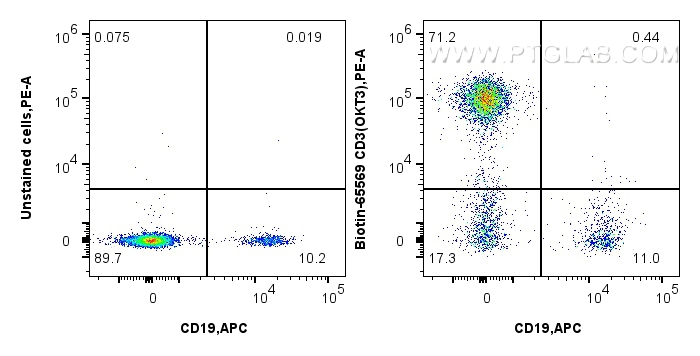验证数据展示
经过测试的应用
| Positive FC detected in | human PBMCs |
推荐稀释比
| 应用 | 推荐稀释比 |
|---|---|
| Flow Cytometry (FC) | FC : 0.25 ug per 10^6 cells in a 100 µl suspension |
| This reagent has been tested for flow cytometric analysis. It is recommended that this reagent should be titrated in each testing system to obtain optimal results. | |
| Sample-dependent, Check data in validation data gallery. | |
产品信息
Biotin-65569 targets CD3 in FC, ELISA applications and shows reactivity with human samples.
| 经测试应用 | FC, ELISA Application Description |
| 经测试反应性 | human |
| 免疫原 |
Human T cells 种属同源性预测 |
| 宿主/亚型 | Mouse / IgG2a |
| 抗体类别 | Recombinant |
| 产品类型 | Antibody |
| 全称 | CD3e molecule, epsilon (CD3-TCR complex) |
| 别名 | CD3E, CD3 epsilon, CD3-epsilon, OKT3, T3E |
| 计算分子量 | 207 aa, 23 kDa |
| GenBank蛋白编号 | BC049847 |
| 基因名称 | CD3 |
| Gene ID (NCBI) | 916 |
| ENSEMBL Gene ID | ENSG00000198851 |
| RRID | AB_3672373 |
| 偶联类型 | Biotin |
| 形式 | Liquid |
| 纯化方式 | Protein A purification |
| UNIPROT ID | P07766 |
| 储存缓冲液 | PBS with 0.09% sodium azide, pH 7.3. |
| 储存条件 | Store at 2-8°C. Avoid exposure to light. Stable for one year after shipment. |
背景介绍
CD3 is a multimeric protein associated with the T-cell receptor (TCR) to form a complex involved in antigen recognition and signal transduction (PMID: 15885124). CD3 is composed of CD3γ, δ, ε, and ζ chains (PMID: 1826255). It is expressed by thymocytes in a developmentally regulated manner, T cells, and some NK cells (PMID: 3289580). The TCR recognizes antigens bound to major histocompatibility complex (MHC) molecules. TCR-mediated peptide-MHC recognition is transmitted to the CD3 complex, leading to the intracellular signal transduction (PMID: 11985657).
实验方案
| Product Specific Protocols | |
|---|---|
| FC protocol for Biotin CD3 antibody Biotin-65569 | Download protocol |
| Standard Protocols | |
|---|---|
| Click here to view our Standard Protocols |


